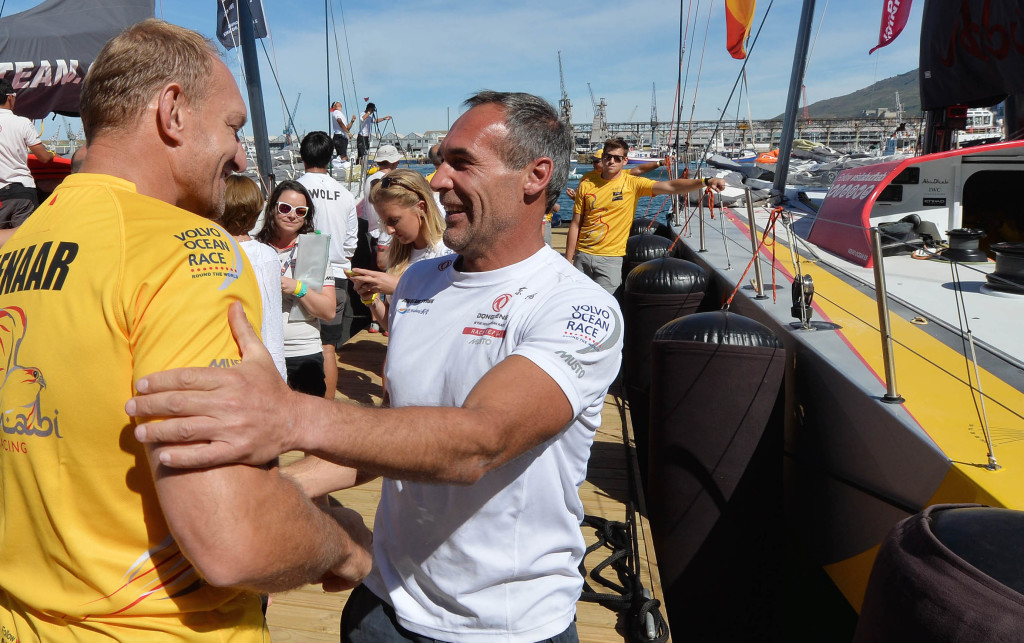As we close the chapter on the team selection controversy that has defined South Africa’s World Cup campaign, here is the transcript of the interview Mike Horn gave two South African journalists in China last week who he claimed quoted him out of context.
The transcript is verbatim, and can be listened to here.
Kevin McCallum: You talk about that high-stress moment, that semifinal was high-stress for all South Africans and then there was also the controversy that was swirling around, how good was it from them to be able to lift themselves from that to play the way they did?
Mike Horn: It was yet again, it is what it is, and we should take it as it is. It doesn’t matter how politics or, or the quota influenced, influenced the players.
You know my job, I think I failed a little bit in my job as as motivator or as high performance coach in a way that I believed, I believed that the Proteas could, could win the World Cup.
And it wasn’t just a false belief. They, they had the team to beat Australia. And it was the final, and the final was going to be against Australia, we’d never lost against New Zealand really.
They’re not a team worth basically losing to although they’d performed very well & (Brendon) McCullum came in and he makes a big difference very quickly but that we knew, it’s all these known factors.
So what actually happened was: okay, the team, um, the team was the team that played and we’re not going into any, any, any politics because but it, it, it had a role to play.
And I had to do a little bit of a talk to the guys, you know after the team was selected and a little bit of energy was taken away from the quarterfinals where the right team could have played (corrects himself) were played and, and my job was basically to say ‘listen guys, now that, now we need to give just a little bit more than what we, than what we gave before.
Now we need to fill gaps, now we have to make the difference with, with less but give more, in a way.
Jean Smyth: So did you have to play a role of mediator, or was it still motivator?
Mike Horn: No, no at this stage it’s just these one on one with the players.
You know you’ve got to kind of remove negative thoughts or explain things to players that don’t usually think, like I said, rationally in that specific moment when okay we know what it is and we know that you want to win and we understand that, all of us understand that very clearly.
But then if you, if I give you a knife to go into a gunfight, you’re going to say ‘Mike, you don’t give me the right tools’.
Give me a gun then I can go and fight because we’re going into a gunfight. But I don’t mind going into a gunfight with a knife as well if I can act first.
[Hesitates] Because if you expect a gun and then somebody is a going to give you a knife, you’re going to be naturally disappointed.
And that disappointment is more my, my job to say ‘listen guys what, what is it that disappoints you about this? Tell me.’
Then we kind of get to the bottom and that’s when I said we have to understand the way they think, not the way I think. Because I think it’s fine, but they don’t think it’s fine.
So, it’s that whole thing of understanding how they think and I think, or what we want to make them think.
Then obviously asking players to give a little bit more because now you need to give more to absorb a little bit more pressure.
We structured our game plan on a 50-over game, game-plan where we wanted to keep seven wickets in hand for the last 10 overs and just go in there and in that small park hit the ball with AB and Faf and Miller and Duminy still, still waiting to come in to bat.
That is, that is a powerful unit to make a big difference against a team like New Zealand.
And then obviously the rain came in and it was the 38th over, 39th over and all of a sudden we’ve got seven wickets in hand, we’re exactly where we wanted to be and you can’t, you can’t have that opportunity to um, to perform.
Your tools get taken away from you again. Now we’re going to play 43 overs and not 50 overs. Those are the vital, that’s the summit, that’s the last bit to the summit, now you’ve got to turn back before you get to the summit.
So, imagine for those players how they’re in that situation, they did exactly what we asked them to do, how disappointing that is for a player and you know that somebody’s slowly taking your opportunities away from you.
Now you don’t have a knife to fight with, now you have to fight with your bare hands and they weren’t ready for that either.
They were ready but yes (change) it’s mindset again, so now they were going from the team (changes tone) – and we’re not speaking about the political things – now they have got to get up again.
How many times must you fall and stand up, you know? And then when Faf and AB went back in, Faf was batting for so long already that obviously that concentration that he was in, in that harmony that he was in became er, was disturbed.
He’s got to come in again and bat, it’s like he’s facing his first ball again. That concentration is no longer there than it was acute like he was when he started.
And it’s not an excuse but then obviously Miller came in, hit it a little bit, er, batted perfectly and then the field is wet, the ball’s heavy and slowly but sure things are, er, crumbling around, even McCullum coming in and hitting, that was planned, it was not a problem.
They were going to get him out and then they haven’t got a good batting line-up when it gets to the back, the ball’s not swinging anymore, you know all these things – that is a bunch of excuses.
You know, and, I think then they got that real urge to fight, then they saw, now they said ‘now we’ve got to make that difference and that’s when they were so hungry to win that they made a couple of mistakes.
Jean Smyth (being rushed to conclude interview): Between the quarterfinal and the semifinal, without going into that stuff (politics), if we talk about team energy, if you could almost put a percentage on it, how much deflation was there, how much building up did you have to do to get back to that level of confidence that came out of the quarterfinal?
Mike Horn: The guys were, like I said, were hyper-motivated.
There was no motivation that had to be done from my side, it was just taking that motivation and channeling it into the right goal at that moment as the goal was taken around, you know moving around like this (gestures with hands), it’s like take that energy now and move it over here and let’s go there.
Take that energy now and move it there, you know constantly which rarely happens in cricket, this is semi-finals, the Proteas can win the first World Cup, they’ve got the opportunity to play Australia, they can beat Australia.
Jis, those guys were hungry. I had to do no motivation. It was just trying to be able to focus the guys on that mind-shift, that goal was going to move around for them.
And at the end of the day I’ve never seen, and I’ve been in sports a little bit and I’ve been disappointed in not getting to summits and I’ve been disappointed by not getting to the North Pole and, you know, failure is something that we have to live with but they, they weren’t ready to fail, they didn’t go out there to fail.
They, they went out there to seriously win and the moment that last over came in they were, they were, it was this personal commitment that they made to themselves that they must perform their best to be able to take this, um, the moment was big, the moment was big and that’s when, you can see just, where in the World Cup do you see really guys running [claps hands] into each other when they have to take a catch?
Where do you see ever that they, you know the throw – it’s luck at the same time in that situation that could change the whole and that’s what makes sport so interesting sometimes I’m just fucking lucky and seriously it’s not because I made the right decision or that my skilled allowed me to…that avalanche that just goes next to me and kills my mate next to me but I’m alive.
It’s not that he made the mistake, it’s just luck. And if you take that luck out of sport it’s not sport anymore.
So, the team was motivated, I did my part where it’s more a presence and they know what I commit to and they come and sometimes just sit next to me and we speak about everything but cricket because we’re not supposed to speak about cricket.
They speak about themselves and their possibilities and that’s the thing about sport. Sport is played here (points to head), not technically, not with the ball, it’s a head game.







